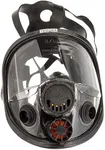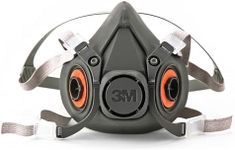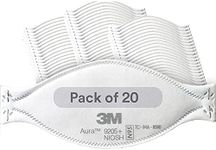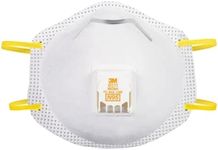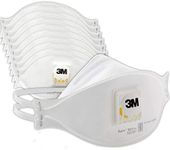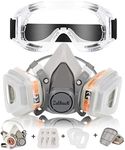Buying Guide for the Best Mask For Wildfire Smoke
Choosing a mask for wildfire smoke is important for protecting your lungs and overall health during smoky conditions. Not all masks are created equal, and some are much better at filtering out harmful particles than others. When shopping for a mask, it's important to understand the key features that make a mask effective against wildfire smoke, and to match those features to your specific needs and activities.Filtration EfficiencyFiltration efficiency refers to how well a mask can filter out tiny particles from the air, especially the fine particles found in wildfire smoke. This is usually measured as a percentage, with higher numbers meaning better protection. Masks are often rated as N95, N99, or N100, which means they filter out 95%, 99%, or 100% of airborne particles, respectively. For wildfire smoke, a mask with at least N95 filtration is recommended. If you are in an area with very heavy smoke or have respiratory issues, you might want to look for even higher filtration. However, higher filtration can also make breathing a bit harder, so consider your comfort and how long you’ll be wearing the mask.
Fit and SealThe fit and seal of a mask determine how well it sits on your face and prevents smoke from leaking in around the edges. A good seal is crucial because even a high-quality filter won’t help if air can sneak in through gaps. Masks come in different shapes and sizes, and some have adjustable nose pieces or straps to help you get a better fit. If you have a smaller or larger face, or if you wear glasses, you may need to try a few styles to find one that seals well for you. Always check for gaps by exhaling sharply and feeling for air leaks around the edges.
BreathabilityBreathability is about how easy it is to breathe through the mask. Masks with higher filtration can sometimes feel stuffy, especially if you’re wearing them for long periods or doing physical activity. Some masks are designed with special materials or exhalation valves to make breathing easier. If you need to wear a mask for several hours or while being active, look for one that balances good filtration with comfortable breathability. However, be aware that masks with exhalation valves may not be suitable in situations where you also need to protect others from your breath, as the valve lets unfiltered air out.
Reusability and MaintenanceSome masks are designed for single use, while others can be reused multiple times. Reusable masks often have replaceable filters, which can be more convenient and environmentally friendly. If you expect to need a mask for several days or weeks, a reusable option might be better. However, reusable masks require regular cleaning and filter replacement to stay effective. Think about how often you’ll use the mask and whether you’re willing to maintain it properly.
Comfort and WearabilityComfort is important, especially if you need to wear the mask for long periods. Features like soft materials, adjustable straps, and lightweight design can make a big difference. If you have sensitive skin or wear glasses, look for masks that are designed to minimize irritation and fogging. Try on different styles if possible to find one that feels comfortable for your face shape and daily activities.
